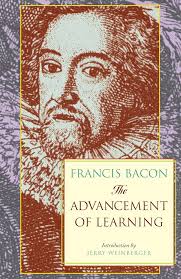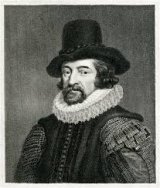The Advancement of Learning Page #38
The Advancement of Learning, published by Francis Bacon in 1605, is a foundational text in the history of science and philosophy. In this work, Bacon advocates for empirical research and the systematic organization of knowledge, laying the groundwork for the scientific method. The book critiques existing scholarly practices and proposes a new approach to learning based on observation and experimentation. It marks a significant shift towards modern scientific inquiry.
- Year:
- 1605
- 1,170 Views
Submitted by acronimous on August 11, 2024
Modified by acronimous on August 11, 2024
from God, so it is not possible that it should be (otherwise than by accident) subject to the laws of heaven and earth, which are the subject of philosophy; and therefore the true knowledge of the nature and state of the soul must come by the same inspiration that gave the substance. Unto this part of knowledge touching the soul there be two appendices; which, as they have been handled, have rather vapoured forth fables than kindled truth: divination and fascination. (2) Divination hath been anciently and fitly divided into artificial and natural: whereof artificial is, when the mind maketh a prediction by argument, concluding upon signs and tokens; natural is, when the mind hath a presention by an internal power, without the inducement of a sign. Artificial is of two sorts: either when the argument is coupled with a derivation of causes, which is rational; or when it is only grounded upon a coincidence of the effect, which is experimental: whereof the latter for the most part is superstitious, such as were the heathen observations upon the inspection of sacrifices, the flights of birds, the swarming of bees; and such as was the Chaldean astrology, and the like. For artificial divination, the several kinds thereof are distributed amongst particular knowledges. The astronomer hath his predictions, as of conjunctions, aspects, eclipses, and the like. The physician hath his predictions, of death, of recovery, of the accidents and issues of diseases. The politique hath his predictions; O urbem venalem, et cito perituram, si emptorem invenerit! which stayed not long to be performed, in Sylla first, and after in Cæsar: so as these predictions are now impertinent, and to be referred over. But the divination which springeth from the internal nature of the soul is that which we now speak of; which hath been made to be of two sorts, primitive and by influxion. Primitive is grounded upon the supposition that the mind, when it is withdrawn and collected into itself, and not diffused into the organs of the body, hath some extent and latitude of prenotion; which therefore appeareth most in sleep, in ecstasies, and near death, and more rarely in waking apprehensions; and is induced and furthered by those abstinences and observances which make the mind most to consist in itself. By influxion, is grounded upon the conceit that the mind, as a mirror or glass, should take illumination from the foreknowledge of God and spirits: unto which the same regiment doth likewise conduce. For the retiring of the mind within itself is the state which is most susceptible of divine influxions; save that it is accompanied in this case with a fervency and elevation (which the ancients noted by fury), and not with a repose and quiet, as it is in the other. (3) Fascination is the power and act of imagination intensive upon other bodies than the body of the imaginant, for of that we spake in the proper place. Wherein the school of Paracelsus, and the disciples of pretended natural magic, have been so intemperate, as they have exalted the power of the imagination to be much one with the power of miracle-working faith. Others, that draw nearer to probability, calling to their view the secret passages of things, and specially of the contagion that passeth from body to body, do conceive it should likewise be agreeable to nature that there should be some transmissions and operations from spirit to spirit without the mediation of the senses; whence the conceits have grown (now almost made civil) of the mastering spirit, and the force of confidence, and the like. Incident unto this is the inquiry how to raise and fortify the imagination; for if the imagination fortified have power, then it is material to know how to fortify and exalt it. And herein comes in crookedly and dangerously a palliation of a great part of ceremonial magic. For it may be pretended that ceremonies, characters, and charms do work, not by any tacit or sacramental contract with evil spirits, but serve only to strengthen the imagination of him that useth it; as images are said by the Roman Church to fix the cogitations and raise the devotions of them that pray before them. But for mine own judgment, if it be admitted that imagination hath power, and that ceremonies fortify imagination, and that they be used sincerely and intentionally for that purpose; yet I should hold them unlawful, as opposing to that first edict which God gave unto man, In sudore vultus comedes panem tuum. For they propound those noble effects, which God hath set forth unto man to be bought at the price of labour, to be attained by a few easy and slothful observances. Deficiences in these knowledges I will report none, other than the general deficience, that it is not known how much of them is verity, and how much vanity. XII. (1) The knowledge which respecteth the faculties of the mind of man is of two kinds—the one respecting his understanding and reason, and the other his will, appetite, and affection; whereof the former produceth position or decree, the latter action or execution. It is true that the imagination is an agent or nuncius in both provinces, both the judicial and the ministerial. For sense sendeth over to imagination before reason have judged, and reason sendeth over to imagination before the decree can be acted. For imagination ever precedeth voluntary motion. Saving that this Janus of imagination hath differing faces: for the face towards reason hath the print of truth, but the face towards action hath the print of good; which nevertheless are faces, “Quales decet esse sororum.” Neither is the imagination simply and only a messenger; but is invested with, or at least wise usurpeth no small authority in itself, besides the duty of the message. For it was well said by Aristotle, “That the mind hath over the body that commandment, which the lord hath over a bondman; but that reason hath over the imagination that commandment which a magistrate hath over a free citizen,” who may come also to rule in his turn. For we see that, in matters of faith and religion, we raise our imagination above our reason, which is the cause why religion sought ever access to the mind by similitudes, types, parables, visions, dreams. And again, in all persuasions that are wrought by eloquence, and other impressions of like nature, which do paint and disguise the true appearance of things, the chief recommendation unto reason is from the imagination. Nevertheless, because I find not any science that doth properly or fitly pertain to the imagination, I see no cause to alter the former division. For as for poesy, it is rather a pleasure or play of imagination than a work or duty thereof. And if it be a work, we speak not now of such parts of learning as the imagination produceth, but of such sciences as handle and consider of the imagination. No more than we
Translation
Translate and read this book in other languages:
Select another language:
- - Select -
- 简体中文 (Chinese - Simplified)
- 繁體中文 (Chinese - Traditional)
- Español (Spanish)
- Esperanto (Esperanto)
- 日本語 (Japanese)
- Português (Portuguese)
- Deutsch (German)
- العربية (Arabic)
- Français (French)
- Русский (Russian)
- ಕನ್ನಡ (Kannada)
- 한국어 (Korean)
- עברית (Hebrew)
- Gaeilge (Irish)
- Українська (Ukrainian)
- اردو (Urdu)
- Magyar (Hungarian)
- मानक हिन्दी (Hindi)
- Indonesia (Indonesian)
- Italiano (Italian)
- தமிழ் (Tamil)
- Türkçe (Turkish)
- తెలుగు (Telugu)
- ภาษาไทย (Thai)
- Tiếng Việt (Vietnamese)
- Čeština (Czech)
- Polski (Polish)
- Bahasa Indonesia (Indonesian)
- Românește (Romanian)
- Nederlands (Dutch)
- Ελληνικά (Greek)
- Latinum (Latin)
- Svenska (Swedish)
- Dansk (Danish)
- Suomi (Finnish)
- فارسی (Persian)
- ייִדיש (Yiddish)
- հայերեն (Armenian)
- Norsk (Norwegian)
- English (English)
Citation
Use the citation below to add this book to your bibliography:
Style:MLAChicagoAPA
"The Advancement of Learning Books." Literature.com. STANDS4 LLC, 2025. Web. 10 Mar. 2025. <https://www.literature.com/book/the_advancement_of_learning_3165>.








Discuss this The Advancement of Learning book with the community:
Report Comment
We're doing our best to make sure our content is useful, accurate and safe.
If by any chance you spot an inappropriate comment while navigating through our website please use this form to let us know, and we'll take care of it shortly.
Attachment
You need to be logged in to favorite.
Log In